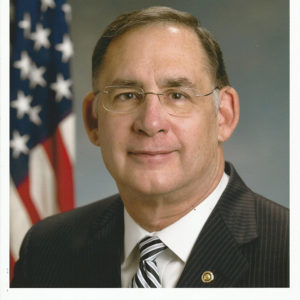calsfoundation@cals.org
John Boozman (1950–)
Businessman and rancher John Boozman became a leading Republican officeholder in the early part of the twenty-first century. First elected to the U.S. House of Representatives in 2001, he was later elected to the Senate and became, in 2015, the state’s senior U.S. senator.
John Boozman was born in Shreveport, Louisiana, on December 10, 1950, to Fay Winford Boozman Jr. and Marie Nichols Boozman. Fay Boozman was a U.S. Air Force master sergeant, and the family moved frequently when John was young. Boozman spent his high school years in Arkansas, graduating from Northside High School in Fort Smith (Sebastian County). Boozman played football for the University of Arkansas (UA) in Fayetteville (Washington County), which he attended from 1969 to 1972. He fulfilled his pre-optometry requirements at UA and went on to graduate from the Southern College of Optometry in 1977.
He married Cathy Marley in 1972, and the couple had three daughters.
Following graduation, Boozman entered private practice and, with his brother Fay, co-founded the BoozmanHof Regional Eye Clinic in Rogers (Benton County). During this same period, he also owned and operated a ranch, raising cattle that his daughters often showed in local, state, and national competitions.
After serving on the Rogers School Board from 1994 to 2001, Boozman sought election to Congress in a special election in the fall of 2001. Seeking to fill the seat Asa Hutchinson vacated to become head of the Drug Enforcement Administration (DEA) in the administration of George W. Bush, Boozman defeated Gunnar DeLay in the primary run-off and then Democrat Mike Hathorn in the November general election. He left his optometry clinic upon his election.
During almost a decade in the House, Boozman served on the Veterans Affairs Committee, where, as a ranking member of the Economic Opportunity Subcommittee, he was deeply involved in the efforts to improve the transition to civilian life for veterans. He authored important policy provisions that included improvements to treatments for service members afflicted with eye trauma, and he also worked to reinstate veteran work-study benefits under the GI Bill. He also served as a member of the Speaker’s Task Force for a Drug-Free America. Boozman soon began to climb the party’s leadership ladder. From 2003 to 2011, he served as assistant Republican whip. In addition, he served as a member of the House Policy Committee, a group that helped analyze the issues coming before the House and then tried to formulate and develop legislation to respond.
In 2010, rather than seeking reelection to the House, Boozman sought the Senate seat held by Democrat Blanche Lincoln. While Boozman won the Republican primary with more than fifty percent of the vote in a multi-candidate field, Lincoln was forced into a run-off, narrowly staving off a challenge from Lieutenant Governor Bill Halter. Boozman won the general election with a 57.9 to 37.0 percent margin.
As a U.S. senator, Boozman began serving on the Committee on Agriculture, Nutrition, and Forestry, and its Subcommittee on Conservation, Forestry, and Natural Resources, as well as the Subcommittee on Nutrition, Specialty Crops, and Agricultural Research. He has also had a seat on the influential Committee on Appropriations, where he served as chairman of the Subcommittee on Financial Services and General Government. His other committee assignments have included the Committee on Veterans Affairs, the Committee on Environment and Public Works, and the Committee on Rules and Administration.
In addition, Boozman began serving on the Commission on Security and Cooperation in Europe, also known as the Helsinki Commission, which was created in 1976 to monitor compliance with the Helsinki Accords. Boozman had emergency heart surgery in late April 2014 to repair a flawed aorta, returning to the Senate in June and announcing soon afterward that he would seek reelection in 2016.
Despite the factions that divided the national Republican Party in 2016, Boozman was reelected. Indeed, while Republican presidential nominee Donald Trump’s path to victory was dogged by controversy, Trump easily carried Arkansas, defeating the state’s former first lady, Hillary Clinton, by more than twenty percent. Meanwhile, Boozman, who was outspoken in his condemnation of Trump’s comments about women, supported the party’s nominee, despite criticism from his Democratic opponent, Connor Eldridge. Boozman defeated Eldridge 59.8 percent to 36.2 percent to secure his second term. In 2022, Boozman defeated Natalie James, his Democratic opponent, taking more than 65 percent of the vote.
For additional information:
“John Boozman (1950–).” Biographical Directory of the United States Congress. http://bioguide.congress.gov/scripts/biodisplay.pl?index=b001236 (accessed June 30, 2021).
“John Boozman.” Ballotpedia. https://ballotpedia.org/John_Boozman (accessed June 30, 2021).
“John Boozman.” U.S. Senate. https://www.boozman.senate.gov/public/index.cfm/about (accessed June 30, 2021).
Trygstad, Kyle. “The First Test of GOP Dominance in Arkansas.” Roll Call, February 2, 2015. Online at http://www.rollcall.com/news/home/john-boozman-2016-arkansas (accessed June 30, 2021).
William H. Pruden III
Ravenscroft School
 Divergent Prosperity and the Arc of Reform, 1968–2022
Divergent Prosperity and the Arc of Reform, 1968–2022 Politics and Government
Politics and Government John Boozman
John Boozman 




Comments
No comments on this entry yet.